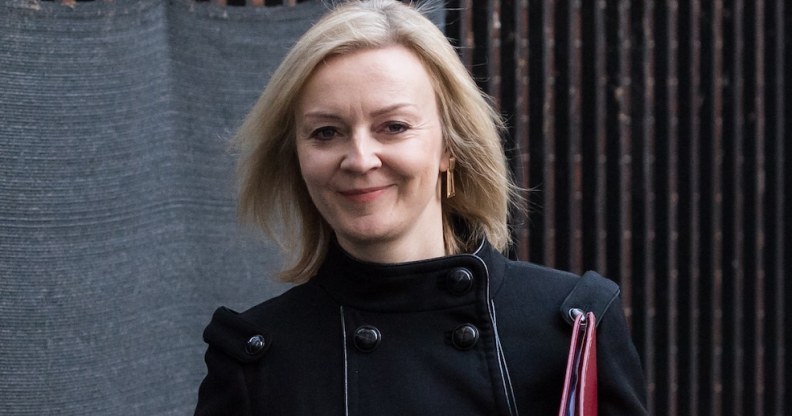Liz Truss says free speech and religion are more important than outright conversion therapy ban

Liz Truss believes people can consent to conversion therapy. (Anadolu Agency via Getty/ Wiktor Szymanowicz)
Liz Truss has confirmed that the government’s conversion therapy ban will include religious and free speech exemptions, and a “dangerous” loophole for “consenting adults”.
Last month, government finally published its consultation document for a conversion therapy ban, but its content was alarming.
It proposed exemptions in law for religious conversion practices, like prayer and “everyday religious practice”, leaving those in faith communities especially vulnerable to legal conversion therapy.
It also created a loophole for “consenting adults”, despite the widely accepted legal concept that people cannot consent to serious harm.
On Wednesday (24 November), Truss was asked by Labour MP Kate Osborne in the House of Commons to confirm if the government’s conversion therapy ban “will cover non-physical conversion practices in religious settings, including prayer” and whether she would “remove the dangerous consent loophole”.
Despite the outrage over gaping holes in the government conversion therapy consultation document since its release, Truss stood by the loopholes.
She said: “What is important is that we make sure people are no coerced into conversion therapy. But it’s also important that we protect freedom of speech, the ability for adults to consent, and the freedom to express [religious] teachings.”
Liz Truss confirms that loopholes in the proposed upcoming LGBTQ+ conversion therapy ban WILL remain in place.
Therefore, forms of conversion therapy WILL remain legal practise in the UK.#ConversionTherapy pic.twitter.com/nPqEmerlct
— LGBwiththeT (@LGBwiththeT) November 24, 2021
Liz Truss’ comments sparked renewed fury over the government proposals
For many, Liz Truss’ comments slashed all hope that the government’s proposed legislation could be developed into a comprehensive conversion therapy ban.
One Twitter user asked: “Begs the question – what’s the point of the consultation if their minds are made up?”
“Makes one wonder if the only point of the ‘consultation’ is use it to give authority to these views,” wrote another Twitter user, “should it be hijacked by anti-trans/anti-LGBT+ voices.”
People like Truss and Boris never wanted to ban conversion therapy and you have to be pretty dim not to know that. That’s why they blocked Theresa May’s planned reforms, met with the ‘ex-gay movement’ and introduced this farcical idea that bans nothing not already illegal https://t.co/ehgZ2i0Ez1— Shock Treated (@JoeSheedy91) November 24, 2021
Another person tweeted: “If loopholes remain, then you are doing very little to stop conversion therapy.
“You are ensuring vulnerable people are still at risk to these practices – it is wrong, the government knows it is, and they don’t care.”

